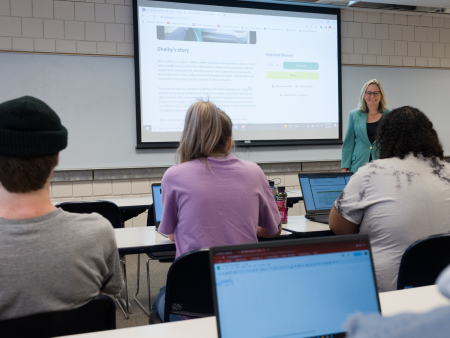Economics
How do people make decisions about work, wealth, and well-being? How do governments affect the overall level of economic activity? How do firms decide how much to produce and what prices to charge? We live in a world of resources, but what makes one resource more valuable than another? If these are questions that are important to you, then an Associate of Arts transfer degree in Economics will get you started.
Many people think economics is only about money, but it's broader than that: it's the study of how decisions get made. In that sense, there are few human endeavors that can't be analyzed and hopefully improved through economic analysis. The analytical and quantitative skills you'll get with an AA in Economics are in high demand in the job market and open doors not only in economics, but also in business, public services, and social services.
What You'll Learn
An AA in Economics will teach you about how our economy works and the issues confronting individuals, businesses, and our society. Your studies will teach you how to:
- Predict how consumers and producers determine their buying and selling options
- Use data to determine the cycles of the economy and how this affects jobs and markets
- Explain how individuals, firms, and countries determine how they specialize production of goods and services
CIP 450601 (DECO)
The purpose of a statewide articulation agreement is to identify the courses a student at a Colorado public community college must complete as part of an AA/AS degree to be guaranteed to be able to complete the designated baccalaureate degree program at public four-year colleges and universities as designated by the Colorado Department of Higher Education (CDHE) transfer agreement.
For more information about this transfer degree please refer to the Colorado Department of Higher Education website.
Admission Requirements
Program Requirements
- GT - Two GT Pathways Arts & Humanities courses (GT-AH1, GT-AH2, GT-AH3, or GT-AH4)
Recommended: PHI 1012 - Ethics: GT-AH3 OR PHI 2005 - Business Ethics: GT-AH3
- GT - One Guaranteed Transfer History course (GT-HI1)
- Two GT Pathways Social & Behavioral Sciences courses (GT-SS1, GT-SS2, GT-SS3)
- GT - Two Guaranteed Transfer Natural and Physical Sciences courses (GT-SC1, GT-SC2), one must be with laboratory (GT-SC1).
Elective credit must be completed from the following lists of approved prefixes or courses to bring the total credit hours to 60.
- Any Guaranteed Transfer course.
- Any course in the following prefixes except Special Topics, Independent Study, Capstone, and Internships: ANT, ART, BIO (1000 OR above), CHE, ECO, HIS, HUM, LIT, MUS, PED, PHI, PHY (1105 OR above), POS, PSY, SOC.
- ENG 1031 - Technical Writing I: GT-CO1 3 Credits (OR higher ENG course)
- MAT 1240 - Mathematics for Liberal Arts: GT-MA1 4 Credits (OR higher MAT course)
- ANY Foreign Language (including ASL) numbered 1011 or higher
Any additional courses taken in the discipline covered by this agreement might not count toward the requirements of the major at the receiving institution.
Students may need to take additional preparatory math courses for placement into Calculus I (e.g., trigonometry, college algebra, precalculus); these additional courses may apply toward electives.
Students intending to transfer to Adams State University, Metropolitan State University of Denver, or the University of Northern Colorado may take College Algebra or Finite Mathematics instead of Calculus I.
All courses required for this degree must be completed with a "C" or better to be considered for transfer to another Colorado institution. Transferability of courses to colleges or universities outside of Colorado is determined by the receiving institution.
Graduation Requirements
- Apply for graduation online atwww.arapahoe.edu/graduation.
ACC academic plans will help guide you through your chosen program. The academic plan will provide you with important information, like which semesters courses are offered if there are any prerequisites or co-requisites for courses, program outcomes, course sequence recommendations, notes for the program, graduation requirements, and other important information. These are updated annually, so we recommend downloading a copy of yours to keep on track to graduation.

